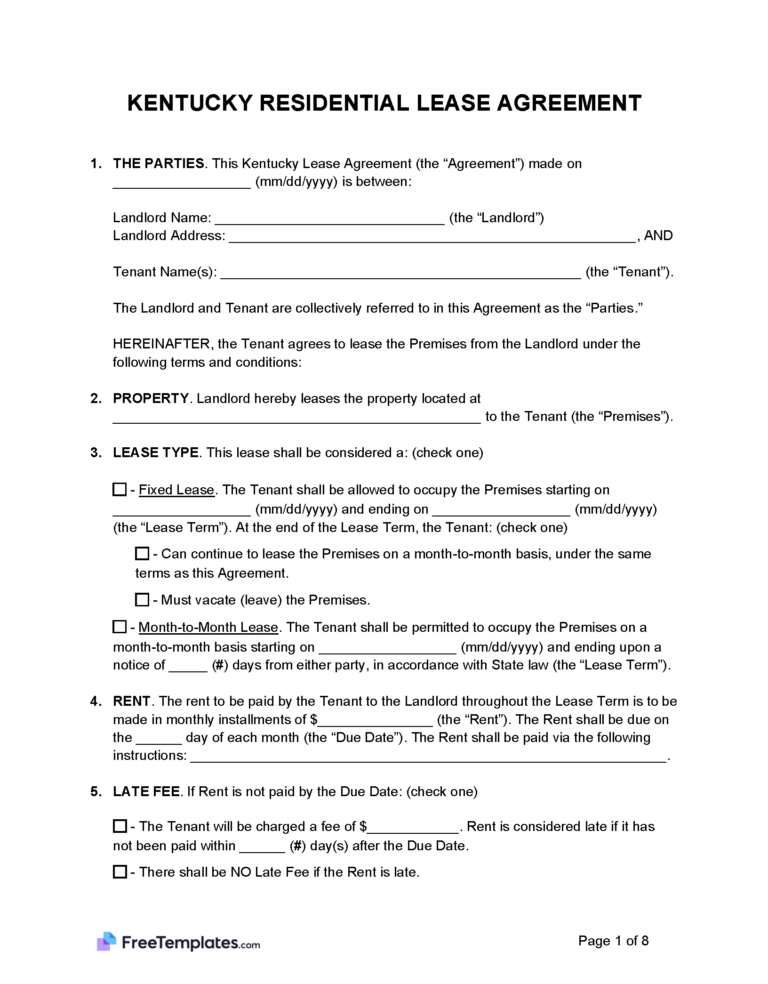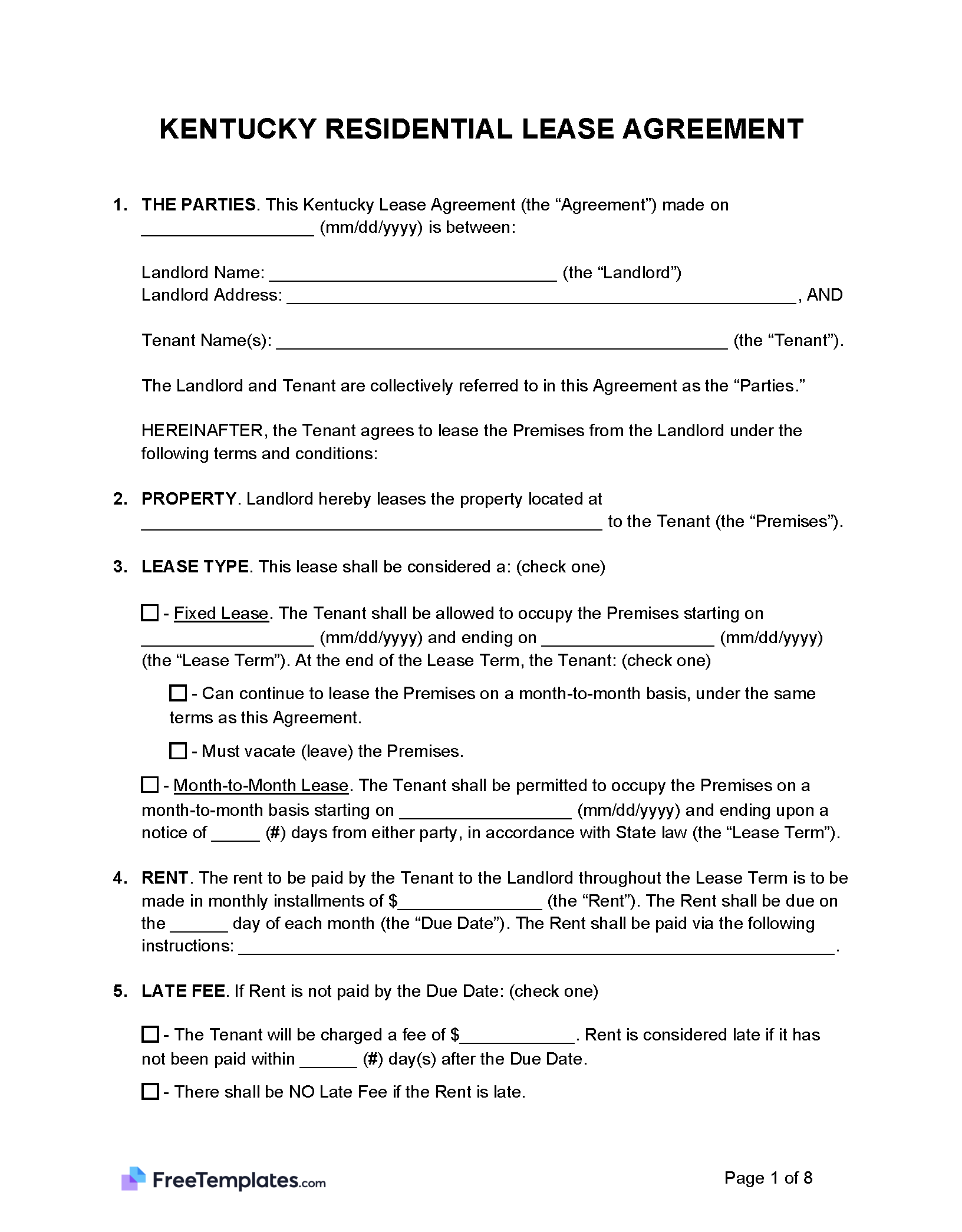By Type (6)
| Standard Lease Agreement – A legally binding rental arrangement established between a landlord and a tenant for a fixed amount of time. |
| Commercial Lease Agreement – A legal document allowing a business to rent a property for industrial, retail, or office space. |
| Month-to-Month Lease Agreement – This is a shorter lease option for those seeking flexibility. The contract is for a month. The landlord or the tenant can terminate the lease with 30 days’ notice; otherwise, the contract typically automatically renews for the next month. |
| Rent-to-Own Agreement – A lease arrangement that allows the tenant to purchase the property after a disclosed amount of time renting it. This documentation is legally binding. |
| Roommate Agreement – A document that outlines the rules and responsibilities of people who share a living space. |
| Sublease Agreement – With the landlord’s consent, a tenant can rent out all or part of the rental unit to a new tenant. |
Disclosures (4)
Contact Information for Authorized Agents – The landlord is permitted to provide the contact information for anyone authorized to manage the property, as well as the owner or their authorized agent, to receive, process, and confirm notices and demands. This list must be kept up-to-date throughout the lease’s term. (Ky. Rev. Stat. § 383.585(1))
Lead-Based Paint Disclosure – This is only required for buildings built before January 1, 1978. The landlord must disclose the dangers of lead-based paint and inform if there is any on the interior walls of the rental unit.
Move-In Inspection Form – If the landlord requires a security deposit, they must provide a comprehensive list of any existing damages to the unit with the estimated repair cost. Tenants have the right to inspect the rental premises to verify the list before they move in. (Ky. Rev. Stat. § 383.580(2))
Security Deposit Receipt – Prospective tenants must be informed of the location and account number of where their security deposit is being held. (Ky. Rev. Stat. § 383.580(1))
Security Deposit
Maximum Amount – Kentucky does not limit the amount a landlord can charge as a security deposit to a tenant.
Move-Out Inspection – At the end of the lease, landlords must inspect the property and create a list of any new damage to the unit and their estimated repair cost. Tenants have the right to inspect and verify the list before moving out. (Ky. Rev. Stat. § 383.580(3))
Unpaid Rent – If the tenant leaves without paying rent and does not demand the deposit, the landlord can remove the deposit from the account after 30 days and apply it to the debt owed. (Ky. Rev. Stat. § 383.580(6))
Returning to Tenant – If no debt is owed for damages or unpaid rent, the landlord must notify the tenant of the refund amount. If there is no response from the tenant within 60 days, the landlord can keep the deposit. (Ky. Rev. Stat. § 383.580(7))
Landlord Access
General Access – For non-emergency reasons, the landlord must give 2 days’ notice before entering the rental property. The landlord must only enter at a reasonable time. (Ky. Rev. Stat. § 383.615(3))
Emergency Access – In the case of an emergency, the landlord can enter at any time. (Ky. Rev. Stat. § 383.615(2))
Paying Rent
Grace Period – Kentucky has no mandated grace period law for late rent payments. The landlord can issue a Notice to Quit the day after rent is due to begin eviction.
Maximum Late Fee – If the rent is delayed more than 5 days past the date disclosed in the lease, the landlord can charge 20% of the rent or $20, whichever is greater. The lease must specify whether the landlord will impose a fee for late rent. (Ky. Rev. Stat. § 359.215)
Returned Checks (NSF) – In Kentucky, a landlord can charge a $50 fee for any bounced or dishonored checks or payment methods. (Ky. Rev. Stat. § 514.040(4)b)
Withholding Rent – If the landlord willingly fails to provide essential services, the tenant may withhold rent payment. Essential services include heat, running water, hot water, electricity, and gas. (Ky. Rev. Stat. § 383.640(1)a)
Reasons for Eviction (2)
Non-Payment of Rent – Once rent is past due, the landlord must give the tenant a 7-day Notice to Pay, giving the tenant a maximum of 7 days before they must vacate the property. (Ky. Rev. Stat. § 383.660(2))
Non-Compliance – If there is a significant violation of the rental agreement, the landlord can give the tenant a written 14-day Notice to Cure or Quit, which gives the renter 15 days to remedy the breach, or else the lease will be terminated. (Ky. Rev. Stat. § 383.660(1))
- If the tenant violates the lease agreement twice in 6 months, the landlord can terminate the contract with 14 days’ notice. (Ky. Rev. Stat. § 383.660(1))

